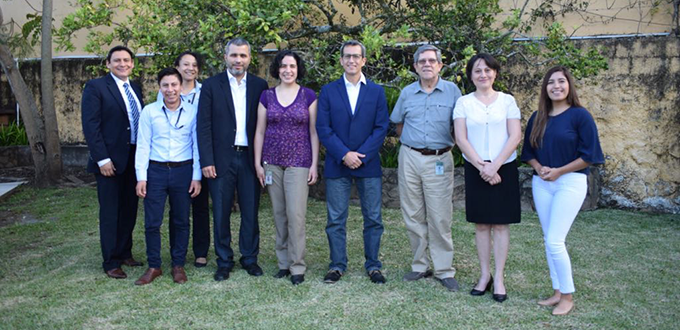LACNIC Tour in Central America: the Strategy Is to Focus on IPv6 Deployment
August 30, 2018

IPv6 deployment has become a strategic issue for the development of Internet connectivity within the region and, above all, in countries where there are still significant segments of the population without network access. This was emphasized by LACNIC CEO Oscar Robles during his visit to operators, governments, regulators, educational institutions and service providers in Guatemala, Honduras and El Salvador.
Robles, accompanied by César Díaz, Head of Strategic Relations and Telecommunications at LACNIC, maintained an intense work agenda in Central America, which included high-level meetings attended by decision-makers to promote IPv6 deployment in a region where IPv6 traffic is still low.
Robles shared LACNIC’s experience with the aim of collaborating with IPv6 deployment efforts in Guatemala, Honduras and El Salvador.
The CEO of the organization responsible for managing Internet number resources in Latin America and the Caribbean stressed that IPv6 deployment is no longer a technical issue but a key topic in view of IPv4 address exhaustion and the need to connect millions of new devices. With the exception of Guatemala, where IPv6 traffic is around 9%, there is almost no IPv6 penetration in Honduras and El Salvador.
Guatemala – The tour began in Guatemala with an interview with the country’s Vice Minister of ICT, Gabriel Juarez, during which IPv6 deployment and cybersecurity issues were discussed. Among other topics, it was highlighted that IPv6 can contribute, for example, to the traceability of online transactions.
Robles and Díaz were then invited to the seat of the Guatemalan Presidency, where they held a very fruitful meeting with Carlos Martínez, Secretary General of the Presidency of Guatemala, and Selvin Suarez, head of the Guatemalan Superintendence of Telecommunications.
The Secretary General of the Presidency of Guatemala was very interested in combining IPv6 deployment with projects of local interest, such as e-health or remote learning, among other initiatives.
The LACNIC team also visited Guatemala’s country code Top-Level Domain (ccTLD) of (.GT)at Universidad del Valle, and highlighted the role of universities in the promotion of IPv6. “Universities must be promoters of new technologies,” said Díaz.
One of the greatest satisfactions in Guatemala was the meeting with LACNIC member TIGO. Miguel Palacios of TIGO informed LACNIC of the achievements in IPv6 deployment in Guatemala and detailed the progress of IPv6 deployment in Honduras and El Salvador. IPv6 traffic in Guatemala is currently about 9%.
In Guatemala, Robles also participated in the inauguration of the Interconnection, Entrepreneurship and Digital Marketing workshop, jointly organized by LACNIC and Google with the support of SIT (see article).

Mesoamérica Project

Conatel
El Salvador and Honduras – In El Salvador, Lito Ibarra, member of the LACNIC Board, joined Oscar Robles and César Díaz to continue their visits. The first meeting was held at the Presidential House with Eric Ramírez and Guillermo Funes of the Technical Secretariat of Planning of the Presidency and of SalCERT (the Salvadoran Computer Security Incident Response Team), where participants focused on promoting IPv6 and improving cyber security.
Then, with the Superintendent of SIGET, Blanca Coto, progress was made towards the possibility of developing IPv6 training programs to create synergies between LACNIC and the regulatory body of El Salvador.
The meeting with technical managers of four universities in El Salvador was extremely fruitful, as they agreed on the promotional role of educational institutions in the use of new technologies.
Likewise, the LACNIC team had the opportunity to talk with CASA TIC, the Salvadoran Chamber of Information and Communication Technologies, whose members include different innovative technology companies. The need for private companies to generate projects that promote IPv6 deployment was stressed during the meeting.
The last item on the Salvadoran agenda was a meeting with Lidia Fromm, of the Mesoamérica Project, where several cross-cutting issues were identified for the deployment of new networks for infrastructure development and integration in Central America.
Finally, the team’s visit to Honduras started with a meeting with COMTELCA’s Executive Secretary, Allan Ruiz and his working team, where they discussed the possibility of including a warning on what is known as e-waste, which poses a barrier for IPv6 deployment, as devices that do not support the new protocol can have a limited service life.
Then, they had a meeting with Nelly Gaeckel of CONATEL, the local regulator, during which LACNIC reaffirmed the convenience of promoting IPv6, instead of forcing its use by means of regulations. “We presented regional success stories where dialogue between the technical community, governments, and academia have led to positive results,” Díaz noted.
The tour ended with a visit to State Operator HONDUTEL, a LACNIC member company with the ability to positively influence the progress of IPv6, as its clients include major companies in Honduras.
(Free access, no subscription required)